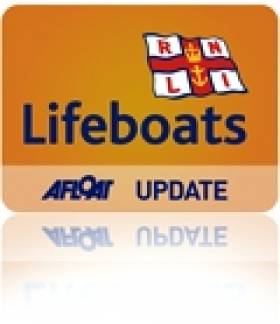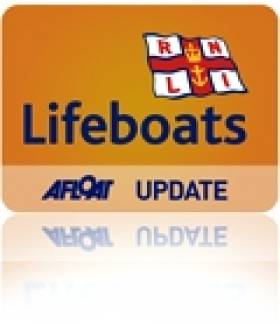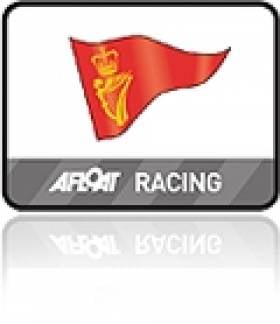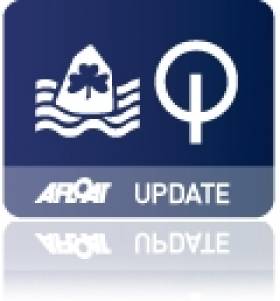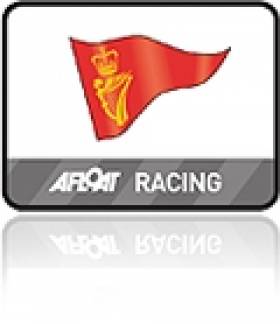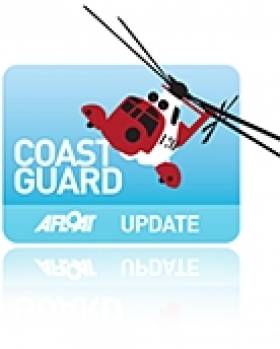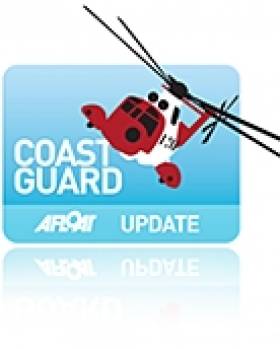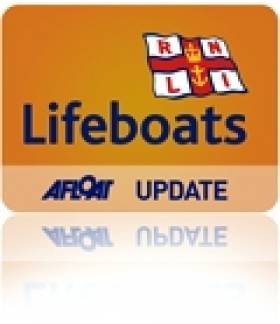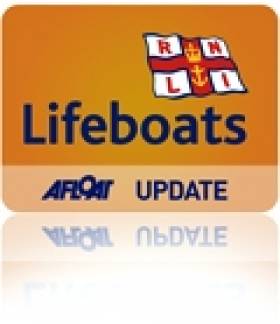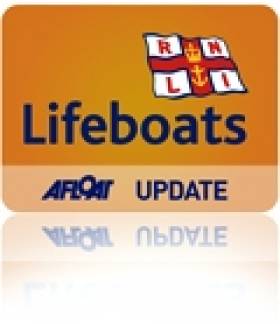Displaying items by tag: Crosshaven
Crosshaven RNLI In Early Hours Search For Missing Person
#RNLI - The Crosshaven RNLI volunteer crew were paged in the early hours of Saturday 3 August to reports of a missing person separated from friends at Salve Marina near Cork Harbour.
The lifeboat, with Alan Venner, Kieran Coniry and Denis Cronin on board, was launched along with Crosshaven coastguard and the Irish Coast Guard's Rescue 115 helicopter, to made multiple searches of all the marinas and the Owenboy River, until reports were received from Gardaí that the missing person had been located at his home address.
The lifeboat was then stood down and returned to station, refuelled, washed, and ready for service at 5am.
Commenting on the service, lifeboat station manager Alan Barton said: "Thankfully, this did not end in a tragedy. The friends of the missing person took the correct course of action by calling us – a false alarm with good intent."
#rnli – A 36' motor cruiser on passage from Kinsale to Crosshaven with two people on board, lost one of its two engines with the second engine showing alarms. As the vessel was off Ringabella and on a lee shore, the skipper requested assistance.
At 5.50pm this afternoon, the pagers of the volunteer crew at Crosshaven RNLI were activated and Aidan O'Connor, Vincent Fleming and Ritchie Kelleher launched into force 6 South Easterly winds and rough seas, met with the vessel off Roches Point and escorted it safely to Crosshaven.
Royal Cork Yacht Club Celebrates Blue Flag Marina Status
#marinas – The Royal Cork Yacht Club marina in Crosshaven in Cork Harbour is the only new marina in Ireland that has attained Blue Flag status in 2013 and is one of only three new Blue Flags awarded this year. The news of the new eco award for Cork was previously reported on Afloat.ie here.
Steeped in history, the Royal Cork Yacht Club in Crosshaven, Co. Cork, prides itself on being the oldest Yacht Club in the world and the award of Blue Flag status comes after last year's award of 5 Gold Anchor Marina status as well as an ICOMIA Clean Marina Award – an internationally recognised sure sign of a quality marina. ICOMIA is the International Council of Marine Industry Associations and represents the recreational boating industry worldwide.
There are now four Blue Flag Marinas in the country, the other three have had the award for the last few years and they are Kilmore Quay in Wexford, the Three Sisters Marina in New Ross and Killinure Point Marina in Westmeath.
The Royal Cork Yacht Club was the only new marina in Ireland that has attained Blue Flag status in 2013 and there was huge emphasis during the presentations on how difficult is for a marina to attain Blue Flag status.
Gavin Deane, General Manager, Royal Cork Yacht Club said: "This is another terrific achievement for the Club. Mark Ring, the Marina & Racing Coordinator at the Royal Cork led the project and put months of work into achieving Blue Flag status so it's great to see that work paying off. We can now call ourselves the oldest and cleanest yacht club in the world!"
The awards comes as planning begins for Cork Week 2014 Ireland's most prestigious yachting regatta, which takes place at the club in Crosshaven in July next year.
2013 Optimist Trials at Crosshaven End in Light airs
As expected, today was light with 4/5 knots of South/South Easterly breeze and this increased to about 8 knots for the second race of the day at Royal Cork's Optimist trials writes Claire Bateman.
This completed the schedule of sixteen races to count for the nineteen places available for the 2013 Irish Optimist Squads.
With a flood tide and a current flowing over the Curlane Bank as it divided around Spike Island both races had general recalls and I got an excellent account of the racing from Toby Hudson – Fowler of the Royal St. George Yacht Club.
He is a very articulate and personable young sailor and a joy to speak with. He is a great ambassador for the RStGYC and a great credit to his family.
He described the recall for the first race that was blackflagged and also the second race that suffered two general recalls and also blackflagged. He was very interesting in his description of the conditions and the wind shifts coming off the land. If he is typical of the competitors coming up in the Optimist Class then they are indeed very fortunate.
The only change in the top five positions today was that James McCann and Alix Buckley changed places with McCann moving to fourth place and this meant that there are three Royal Cork sailors in the top five.
Interestingly enough Cathal O'Regan, a Junior sailor from the Royal Cork, took the bullet in the first race of the day and that is a great fillip for his confidence. In the last race of the day it was Peter Fegan of SSC took the win with Harry Durcan second.
When the three discards were applied Harry Durcan was but a mere three points behind his brother Johnny who took first place overall in the trials.
The next Optimist event listed is the Ulsters to take place on May 25th and 26th, 2013.
Perfect sailing conditions on the south coast marked the finale of the Marshall Marine Textiles April sailing League at Royal Cork Yacht Club on Saturday writes Claire Bateman.
There was a northerly breeze tempered by the bright sunshine and the cruisers were sent to No. 5 before beating in the harbour to No. 10 and then on to a course that gave them plenty of running, reaching and beating before returning to finish at Grassy. The day was described by Batt O'Leary, winner of IHS, as a wonderful and most enjoyable day of sailing of which there have not been too many so far this season.
Also sailing in the harbour were Fevas and some Laser Radials out for practice. However, the biggest gathering of boats was reserved for the Optimists, with the beginners group having a ball with their Instructors and other more senior Optimist sailors giving a helping hand.
Also in view of the forthcoming Optimist trials next weekend for the International Team, a group of Optimist Sailors from Kinsale Yacht Club were working up and joined with a group from TeamX Training from Dublin who were accompanied by their Coach Denis Passke assisted by Séafra Guilfoyle and they later joined in with the regular Royal Cork Optimist sailors racing under Race Officer Michael McCann.
Hopefully today saw the start of the fine weather for the coming sailing season and the new Optimist Class Captain, Frank Thompson, should be very pleased with the success of the day and the previous weekend highly successful novice intruductory session.
#coastguard – Minister for Transport, Tourism & Sport Leo Varadkar has welcomed the opening of a new state-of-the-art Irish Coast Guard facility at Crosshaven in Co. Cork.
The purpose-built facility was developed by the Department of Transport, Tourism & Sport and the OPW to provide a modern base for Crosshaven Volunteer Coast Guard Unit, as well as a Coast Guard Regional HQ and Training centre. The building can also serve as an emergency management co-ordination centre for use by other statutory services.
Minister Varadkar said: 'The Crosshaven team is made up of 20 local volunteer members and I am delighted to have this opportunity to thank them for their dedication and hard work. They train every week and provide weekly for a 24 hour, seven day emergency response to shoreline and coastal emergencies. I also want to congratulate the volunteers who today received their long-service medals. They are richly deserved'.
The new station was officially opened on behalf of the Government by Minister for Agriculture, Food and the Marine Simon Coveney, who also presented long service medals to volunteers drawn from local Coast Guard Units. Following the ceremony a Coast Guard helicopter landed in the vicinity of the station, affording members of the public an opportunity to view the helicopter and to meet the crew.
The largest element of the Crosshaven building is the boathouse or garage area, which is fitted with large roller shutter doors to allow for the rapid response of vehicles and boats. The upper level has an operations room, office and training room.
Minister to Open New Coast Guard Building in Crosshaven
Minister for Agriculture, Food and the Marine Simon Coveney TD will officiate at the opening of a new Coast Guard building tomorrow afternoon in Crosshaven.
The purpose built facility will serve as a Base for Crosshaven Volunteer Coast Guard Unit, as well as a Coast Guard Regional HQ and Training centre. The building can also serve as an emergency management co-ordination centre for use by other statutory services.
Minister Coveney will also present long service medals to Coast Guard volunteers drawn from local Coast Guard Units.
After the ceremony a Coast Guard helicopter will land in the vicinity of the station affording members of the public an opportunity to view the helicopter and meet the crew.
Crosshaven Lifeboat Rescues Skipper from Sinking Fishing Boat
#rnli – Last night at 8.40pm, as the Crosshaven RNLI lifeboat was returning from exercise, information was received from Valentia Coast Guard Radio of a distress flare sighted about 1 miles South of Gyleen. Further information received was of a 37' fishing vessel taking on water. The Volunteer crew quickly loaded a salvage pump and headed to the incident. Ballycotton Lifeboat was also on exercise and made best speed towards the incident. On arrival, it was found the fishing vessel had sank and the lone skipper had abandoned to a liferaft. The Crosshaven crew brought the casualty on board the lifeboat before he was brought back to the Lifeboat station. The skipper was checked out by the Lifeboat Doctor and found to be well.
The volunteer crew were Warren Forbes (Helm), Geraldine Farrell and James Fagan.
#lifeboat – Crosshaven RNLI lifeboat were called upon to assist two vessels within two days.
The first call came on Wednesday afternoon (22 Aug) after a 16' motor boat suffered mechanical failure behind Haulbowline Island. The boat owner had deployed his anchor while awaiting help to arrive. On arrival, the newest recruit to the lifeboat crew, Ian O'Keefe, managed to get the engine started before the lifeboat escorted the vessel to Monkstown Marina.
Last night, Valentia Coast Guard tasked the lifeboat to a 36' yacht, South of Roches Point. The yacht was on passage from the UK, and had suffered both rigging and mechanical failure during the night. The yacht had been drifting for several hours before being able to request assistance. The crew of four were exhausted with one person disabled due to seasickness.
One of the volunteer crew boarded the yacht and checked on the condition of the crew, before setting up a tow with the lifeboat. The casualty vessel was then taken in tow to Crosshaven Boatyard. The Volunteer crew on this service were Mark Bushe (helm) with Bernard Lynch and Vincent Fleming.
Vessels from the Naval service and the Port of Cork also responded to the scene.
#rnil – A French yacht with a fouled propelller on passage to Kinsale in foggy conditions has been towed safely to Crosshaven in Co. Cork by the RNLI. At 7.20pm last night, Valentia Coast Guard tasked Crosshaven RNLI lifeboat to assist a 12m yacht with two people on board, 2 miles south of Power Head that had a fouled propellor. Weather conditions at the time were calm with heavy fog banks rolling off the coast.
Roberts Head is midway between the mouth of Cork Harbour and Kinsale the French registered yacht was on passage to Kinsale when they became entangled in an old lobster pot line and were effectively anchored. Crosshaven Lifeboat under the command of Ian Venner with crew Ritchie Kelleher and Vincent Fleming cut away the line and took the yacht in tow, arriving back in Crosshaven some 2 hours later.
The yacht was safely berthed at the Boatyard.


























